Freestanding Ice Maker: Why isn't my freestanding ice maker making much ice?
If the ice maker is running but doesn't make much ice, water supply problems, a control board failure, a weak recirculation pump, clogs in the water distributer or a faulty cutting grid could be the cause. First, check ice cube thickness. If the cubes are thin, a clogged water filter, problem with the water supply or clogged inlet water valve will cause thin cubes. If your ice maker uses a water filter, replace the water filter to improve water flow to the ice maker.
If ice cubes are still thin after replacing the filter or your ice maker doesn't have a filter, check the ice maker's water supply. Unplug the ice maker and shut off the ice maker's water supply. Disconnect the water supply line and place the end of the supply line in a container. Briefly turn on the water supply and check water flow through the supply line. If water flow through the supply line is weak, have a plumber fix the water supply going to the ice maker.
If water flows through the supply line okay, check the wire harness connections between the electronic control board and the water inlet valve. Reconnect loose wires and repair damaged wires. If the water inlet valve wiring is okay, reconnect the water line and open the water supply valve going to the ice maker. Run the diagnostic test cycle described on the tech sheet to check the water fill process. (You can typically find the tech sheet inside the control panel or on the back of the ice maker. Make sure that you disconnect the ice maker's electrical power before accessing internal areas to find the tech sheet.) If the water valve opens during the diagnostic test cycle but doesn't fill the reservoir enough to trip the water level switch that indicates when the reservoir is full, then you may need to replace the water inlet valve. If you replace the water inlet valve and the reservoir still doesn't fill up, then a failed electronic control board could be causing the low reservoir water level.
If the reservoir fills up during the diagnostic test, a weak recirculation pump or clogs in the water distributer could be causing thin cubes. Run a cleaning cycle to clean deposits out of the water distributer so water flows freely across the evaporator plate. If ice cubes are still thin after the cleaning cycle, you may need to replace the recirculation pump because the pump isn't moving enough water across the evaporator plate to create thick ice cubes.
The ice maker produces less ice when chunks of uncut ice clog the cutting grid, so check the cutting grid for ice build-up. Replace the cutting grid if you find damaged wires or the wires aren't cutting the full slab of ice into cubes.
Finally, a faulty ice bin thermistor could be detecting a full ice bin when the bin isn't full. Refer to the tech sheet for temperature/resistance values and check the resistance of the bin thermistor using a multimeter and thermometer. Replace the thermistor if its resistance is off by more than 4,000 ohms.

THESE REPAIRS MAY HELP SOLVE YOUR FREESTANDING ICE MAKER PROBLEM
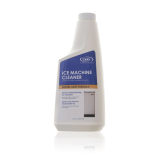
Run an ice maker cleaning cycle
Follow the directions in your owner's manual to run a cleaning cycle on the ice maker. The cleaning cycle removes hard water deposits and residue from the evaporator plate so the ice slab to forms quickly on the evaporator plate.
Run an ice maker cleaning cycle
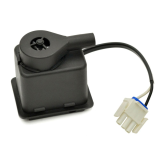
Replace the ice maker recirculation pump
The recirculation pump is in the water reservoir. The recirculation pump distributes water over the evaporator plate to form the ice slab. If the recirculation pump is getting the proper voltage but isn't running or pumping water, replace the recirculation pump.
Ice maker recirculation pump
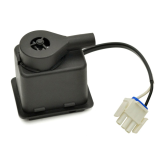
How to replace a freestanding ice maker recirculation pump
If your freestanding ice maker won't make ice, the recirculation pump might by to blame. This step-by-step repair guide shows how to replace an ice maker recirculation pump.
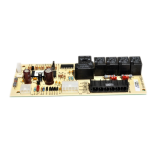
Replace the ice maker electronic control board
The electronic control board manages the various ice maker functions such as filling, running the compressor, and harvesting the ice. If the electronic control board is not operating properly, replace it.
Ice maker electronic control board

How to replace a freestanding ice maker electronic control board
If your freestanding ice maker stops making ice or doesn't work at all, the electronic control board could be the problem. This repair guide has step-by-step instructions for how to replace an ice maker electronic control board.

Replace the ice maker cutter grid
The cutter grid is below the front of the evaporator plate. When the slab of ice slides off the evaporator plate onto the cutter grid, the wires of the cutter grid heat up and cut through the ice slab for form square cubes. If the wires of the cutter grid are broken or don't heat up, replace the cutter grid.
Ice maker cutter grid
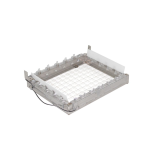
How to replace a freestanding ice maker cutter grid
If your freestanding ice maker sound like it's dropping ice but no ice cubes are in the bin, the cutter grid could be broken. This DIY repair guide shows how to replace an ice maker cutter grid in 15 minutes or less.
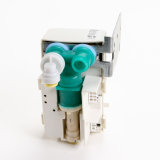
Replace the ice maker water inlet valve
The water inlet valve is behind the lower front grill of the ice maker. The water inlet valve opens to fill the water reservoir when the ice maker first starts and to replace water the freezes on the evaporator plate. If the valve doesn't open or gets clogged with debris, replace the water inlet valve. Also replace the water inlet valve if it fails to shut properly.
Ice maker water inlet valve
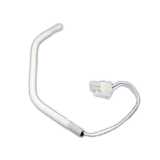
Replace the ice maker bin thermistor
The bin thermistor is inside the ice storage bin at the Full level. When the bin thermistor senses cold from the ice at the Full level, the ice maker shuts down ice production to keep the bin from overflowing. If the ice production continues when the bin is full, replace the bin thermistor.
Ice maker bin thermistor
Most common symptoms to help you fix your freestanding ice makers
Choose a symptom to see related ice maker repairs.
Main causes: failing compressor, bad condenser fan motor, faulty drain pump, bad recirculation pump, water supply proble…
Main causes: dirty evaporator plate, untreated water supply, food items being stored in ice storage bin…
Main causes: wiring failure, broken cutting grid, faulty electronic control board…
Main causes: bad electronic control board, water supply problems, faulty recirculation pump, sealed system failure, brok…
Main causes: cracked water supply line, leaky drain line, broken drain pump, cracked water reservoir, leaky ice bin…
Main causes: bad bin thermistor, condenser fan failure, faulty control board…
Main causes: water supply problems, control board failure, weak recirculation pump, clogged water distributer, faulty cu…
Main causes: lack of electrical power, bad power cord, wiring failure, bad control board, faulty bin thermistor, bad eva…
Most common repair guides to help fix your freestanding ice makers
These step-by-step repair guides will help you safely fix what’s broken on your ice maker.
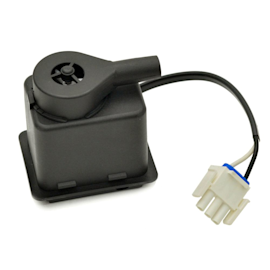
How to replace a freestanding ice maker recirculation pump
If your ice maker isn’t making ice, the pump could be the problem. Here’s how to replace it. …
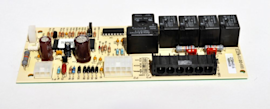
How to replace a freestanding ice maker electronic control board
When the electronic control board won’t activate the ice maker components, follow these steps to install a new one.…
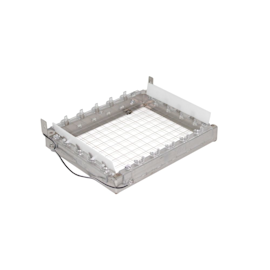
How to replace a freestanding ice maker cutter grid
When the cutting grid is broken, ice cubes don’t drop into the ice bin. Use the steps in this repair guide to replace a…
Effective articles & videos to help repair your freestanding ice makers
Use the advice and tips in these articles and videos to get the most out of your ice maker.

Learn about all the convenient features on our Sears PartsDirect website that make your parts purchases easier.…
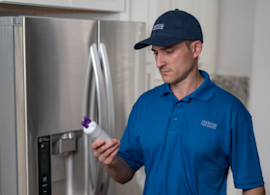
Get answers to frequently asked questions about Sears and Sears PartsDirect.…
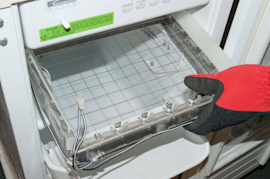
See what troubleshooting steps to take with your freestanding ice maker before calling for repair.…